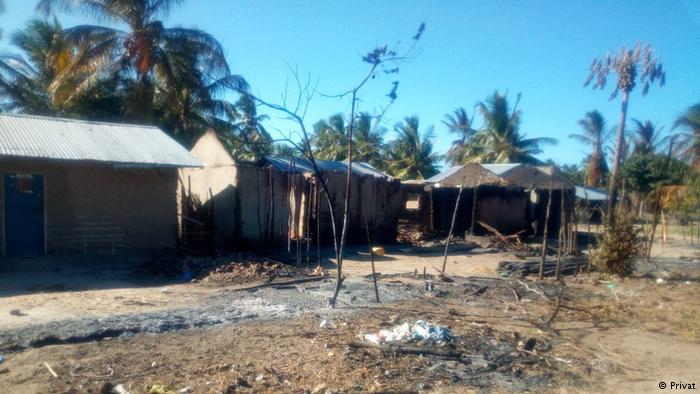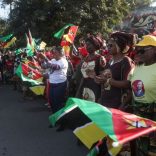Mozambique: Man detained in possession of over 100 grenades in Changara district, Tete province - ...
New attack leaves trail of destruction in Cabo Delgado village

In Mocujo village, Macomia district, attacked last June, houses were also burned down. File photo: DW
An armed group looted and burned a remote village in the northern Mozambican district of Macomia on Saturday (03.11) night without causing casualties, a source from the local authorities told Lusa.
The unknown group entered the village of Unidade, in the administrative post of Quiterajo near the coast, firing firearms, and set fire to 45 homes, a school and a mosque before stealing animals and food from stalls in the village, the source told Lusa.
The village is in the vicinity of others, all in the middle of the bush and accessible only by dirt road, that have been targeted over the last year in the coastal zone of the northeast of the province of Cabo Delgado.
The population of Unidade began to leave their houses on Saturday afternoon after they noticed the presence of strangers near the village, the source said.
It is not known who the attackers were or how many people were in the group. The attack on Saturday night happens after residents of Mocimboa da Praia, the district north of Macomia, reported the departure, in the last days of October and to an unknown destination, of 12 women from the village carrying supplies – raising suspicions that the women may be linked to groups hidden in the woods.
There had been no record for about a month of violence or clashes in that part of Mozambique – located almost 2,000 kilometres north of the capital, Maputo, and on the border withTanzania – following the attacks launched a year ago and which, according to government estimates, have caused around 100 deaths among civilians, the military and the aggressors.
The violence grew after an attack on the village of Mocímboa da Praia in October 2017 by a group based in a local mosque that preached insurgency against the state and whose methods and tone had been the source of friction with residents for at least two years.
The same type of conflict and recruitment, promoted with the support of foreign Muslims, was reported in other mosques in the region during the same period.

Reasons for the attacks
Analysts have been divided among those who say the violence is linked to terrorism or to organised crime – trafficking routes of heroin, rubies, ivory and other products pass through Cabo Delgado.
Other suggested causes are a popular revolt in the face of poverty, old territorial disputes between ethnic groups or even political manipulation aimed at destabilising Mozambique, at a time when oil companies invest in natural gas in Cabo Delgado.
The attacks have always occurred far from the asphalt roads (with the exception of the initial attack on Mocímboa da Praia) and outside the area where oil companies Anadarko, Eni and ExxonMobil are installing infrastructure to exploit natural gas on the Afungi peninsula in the district of Palma.
Since the end of 2017, Mozambican and Tanzanian authorities have announced the arrest of suspects in connection with this wave of violence, and a trial with more than 200 defendants is under way in Pemba, the provincial capital of Cabo Delgado.
They are accused of qualified homicide, possession of prohibited weapons, association to commit a crime against the organisation of the State, instigation or provocation to collective disobedience, and disturbing public order and tranquillity.
The majority are Mozambicans, but there are Tanzanians, Somalis and citizens of Burundi and the Democratic Republic of Congo among the accused, along with 42 women, a source close to the case told Lusa.












Leave a Reply
Be the First to Comment!
You must be logged in to post a comment.
You must be logged in to post a comment.